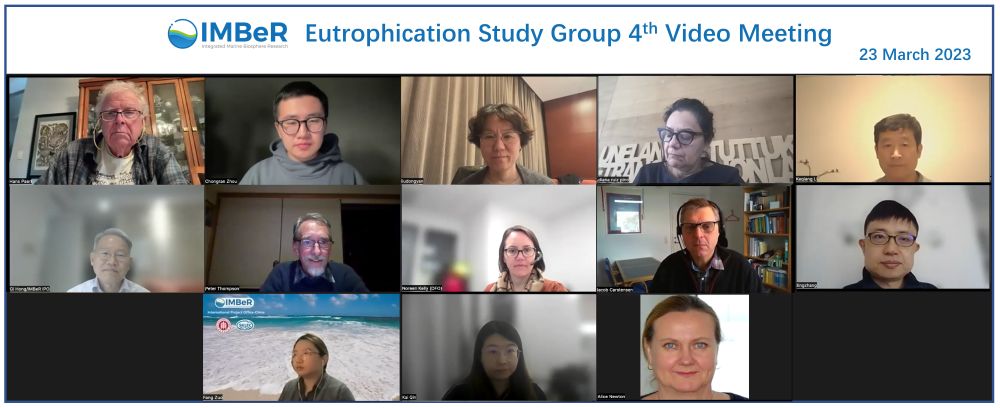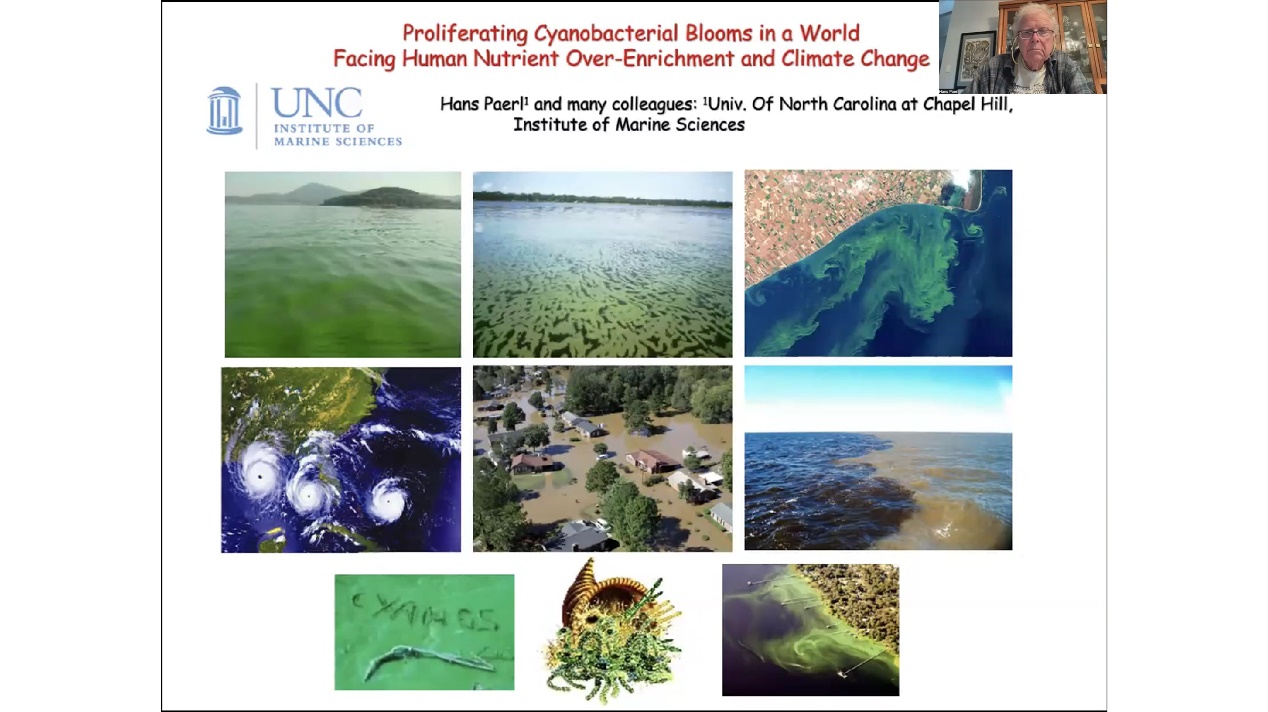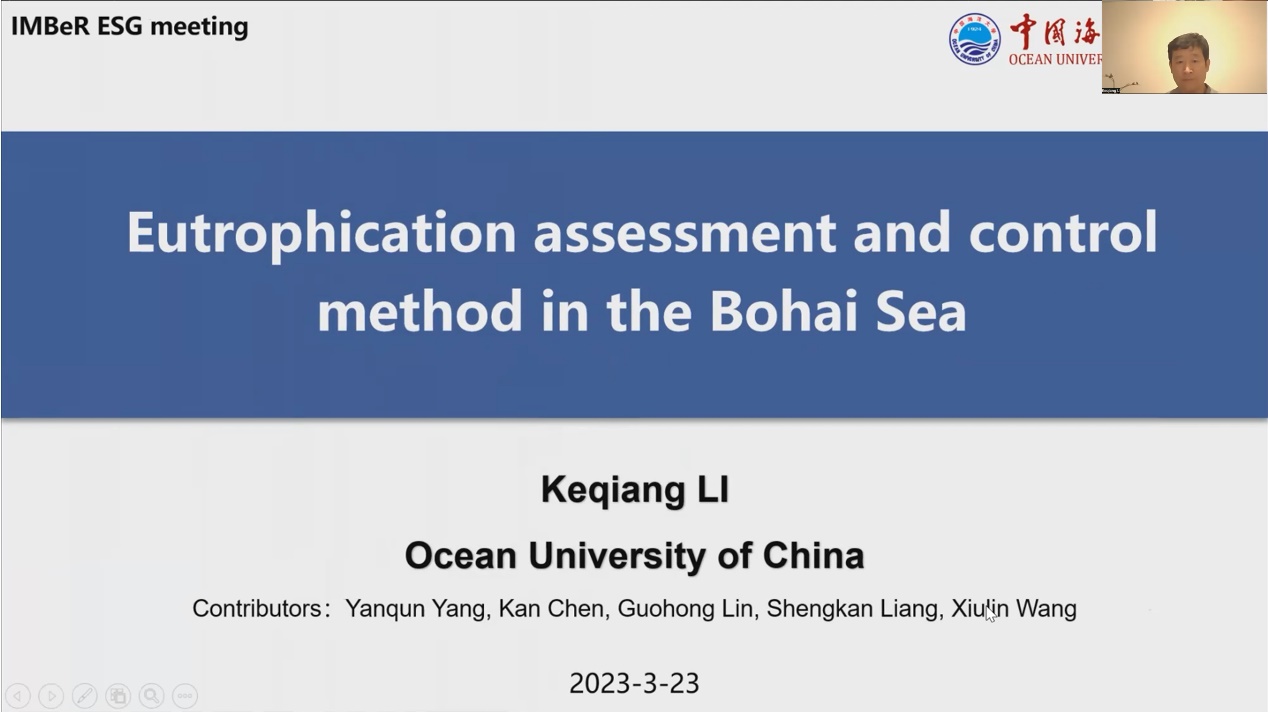会议回顾:IMBeR富营养化工作组第四次线上会议顺利举行
IMBeR富营养化工作组(Eutrophication Study Group,ESG)第四次会议于2023年3月23日顺利举行,由来自澳大利亚联邦科学与工业研究组织(CSIRO, Australia)的Peter Thompson教授(工作组联合主席)主持会议,共计13位专家和IMBeR IPO成员在线出席。Peter Thompson教授对各与会专家表示欢迎,并在报告开始前对第三次会议及工作组的潜在产出进行了总结。本次会议的IMBeR富营养化主题系列报告(IMBeR-ESG-Talks)环节邀请了两位专家作精彩报告。

来自北卡罗来那大学海洋科学研究所(Institute of Marine Sciences, The University of North Carolina)的Hans Paerl教授带来了第一场报告。Hans教授以其团队在中国安徽太湖和北美洲东部伊利湖的研究为例,指出人类活动造成的营养盐过剩和气候变化等因素会导致有害蓝藻水华(简称CyanoHABs)爆发,而这类藻华的次级代谢产物会造成广泛危害,从浮游生物到人类都会受其影响。在报告中,Hans教授不仅介绍了CyanoHABs的三种蓝藻分类,还针对其管理提出了两项具体建议,即采取双重营养盐(总氮和总磷)减少策略和全年限制营养盐输入。

在第二场精彩报告中,来自中国海洋大学的李克强教授介绍了中国渤海海域富营养化评估与管控研究。尽管该地区在2001年、2008年和2018年已分别实施了三项长期环境保护计划,但富营养化现象却仍然存在且日益严重。为调查其原因,李克强教授领导团队就渤海的生态环境变化进行了分析,并对该地区进行了富营养化评估,通过复合富营养化压力指数(Compound Eutrophication Index, CEI)进一步从年际、季节、空间变化的角度测算渤海的生态风险指数(Ecological Risk Index, ERI)。基于此,李克强教授提出了针对渤海地区的富营养化控制策略。

与会人员围绕报告内容展开了热烈的交流,包括筹划今年秋季中国举办线下研讨会和培训班。更多工作组活动即将开展,热切期盼您的关注、参与和支持!
Recap: the 4th IMBeR Eutrophication Study Group Meeting Successfully Held Online
On March 23, 2023, the fourth IMBeR Eutrophication Study Group Meeting was successfully held, with Co-Chair Prof. Peter Thompson of CSIRO (Australia) leading the virtual gathering, which 13 experts and IMBeR IPO staff attended. The meeting started with a warm welcome from Peter, who provided a comprehensive overview of previous sessions, along with an account of the expected outcome. The insightful IMBeR-ESG-Talks delivered by two distinguished experts further enriched the event.
Prof. Hans Paerl, from the Institute of Marine Sciences, at the University of North Carolina, gave the opening talk at the meeting. Drawing upon his team’s research in Lake Taihu in China’s Anhui Province as well as Lake Erie in the east of North America, Hans highlighted how human activities such as nutrient over-enrichment and climate change can trigger the proliferation of cyanobacterial harmful algal blooms (CyanoHABs), whose secondary metabolites could pose risks to everything from zooplankton to humans. In his presentation, Hans introduced the three key “players” influencing CyanoHABs, and proposed two management strategies for addressing them, namely a dual nutrient reduction approach (both N & P) and year-round restrictions on nutrient input.
In the second brilliant talk, Prof. Keqiang Li from the Ocean University of China discussed the assessment and control of eutrophication in the Bohai Sea. Despite implementing three long-term environmental protection plans in the region in 2001, 2008, and 2018, eutrophication remains a persistent and increasingly severe problem. To investigate the reasons behind this, Prof. Li led a team to analyze the ecological environment changes in the area and access eutrophication. The team employed Compound Eutrophication Index (CEI) and calculated the Ecological Risk Index (ERI) of the Bohai Sea from the perspective of interannual, seasonal, and spatial variations. Based on these findings, Prof. Li proposed a strategy for effectively controlling eutrophication in the Bohai Sea region.
The attendees exchanged ideas on the content of the talks, as well as the potential combined writing workshop and training sessions in China during autumn.
More activities will be carried out soon. We are excited to share updates and look forward to your continued attention, participation, and support!








